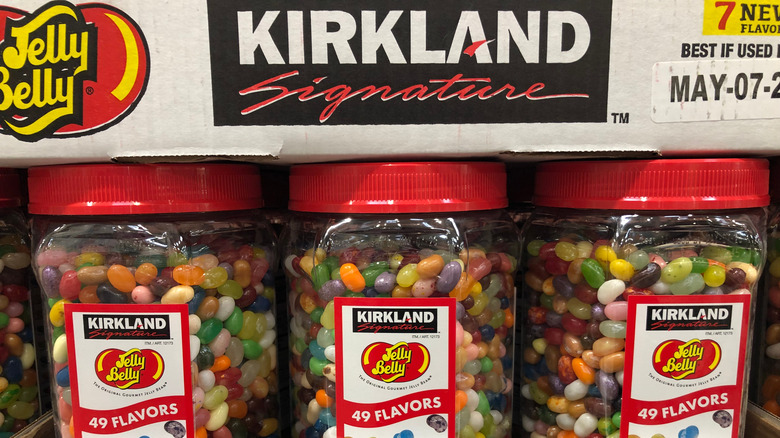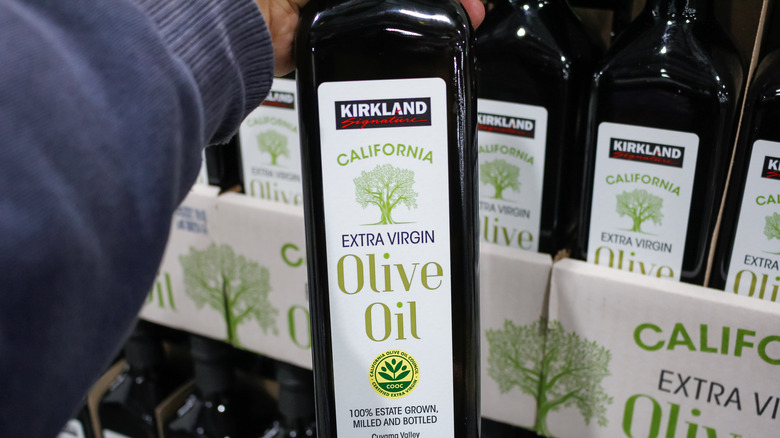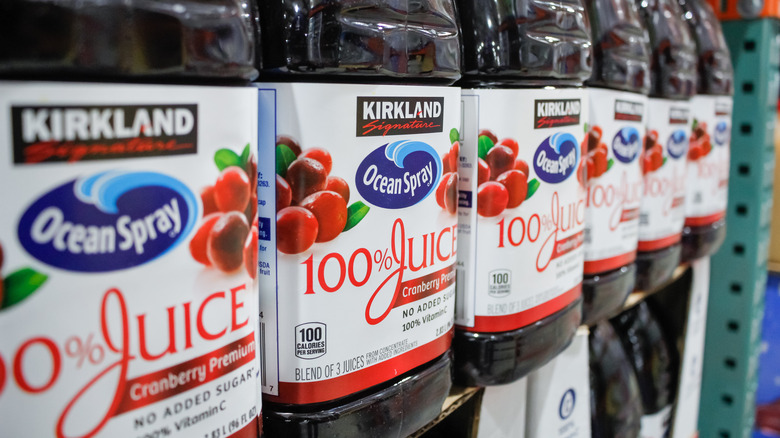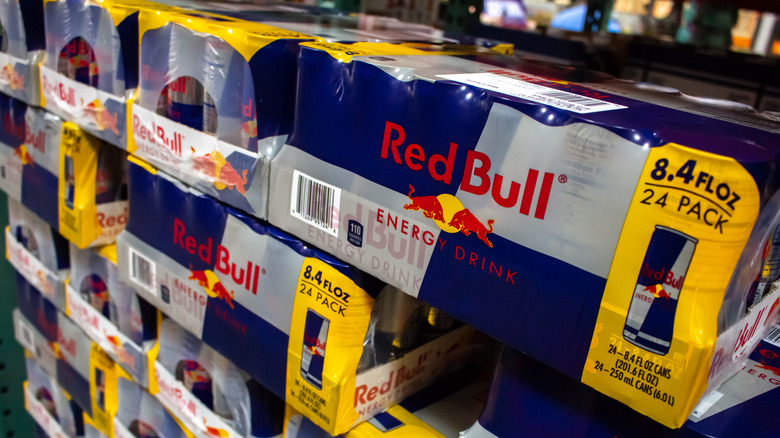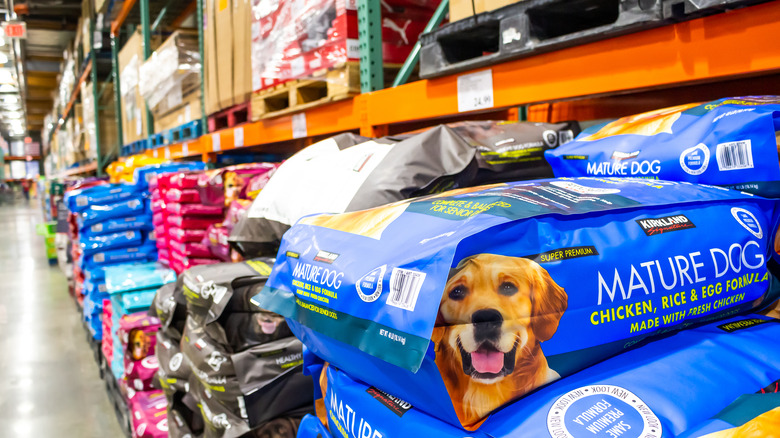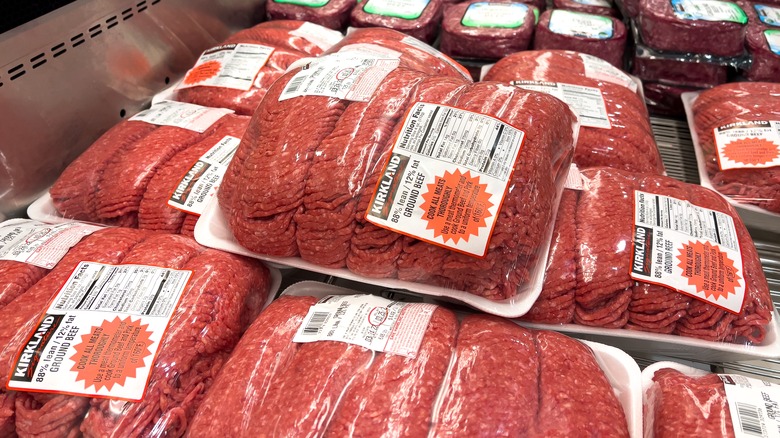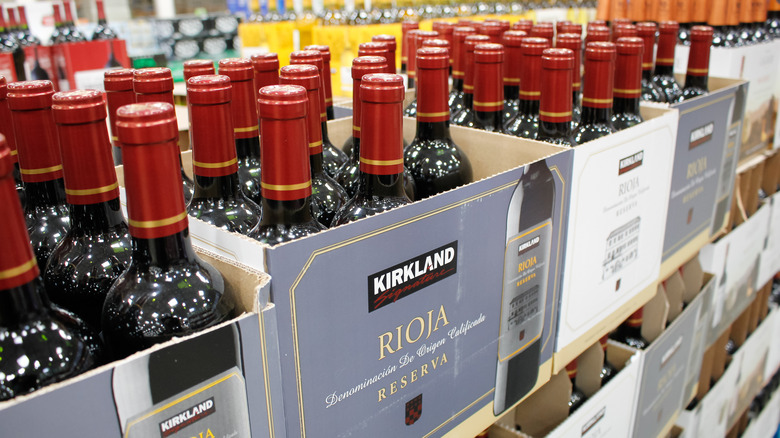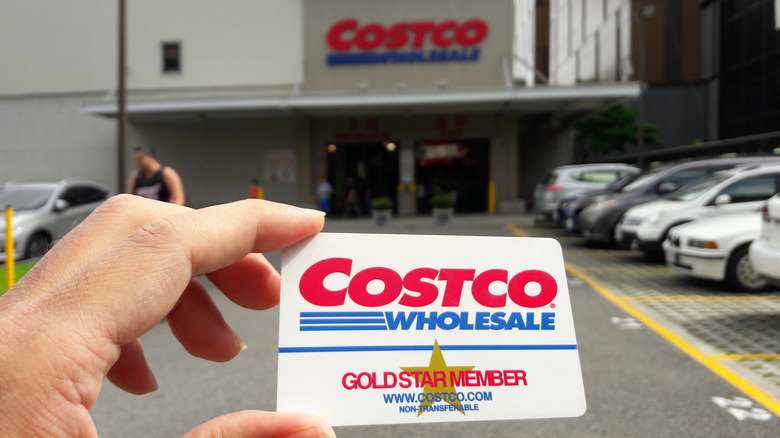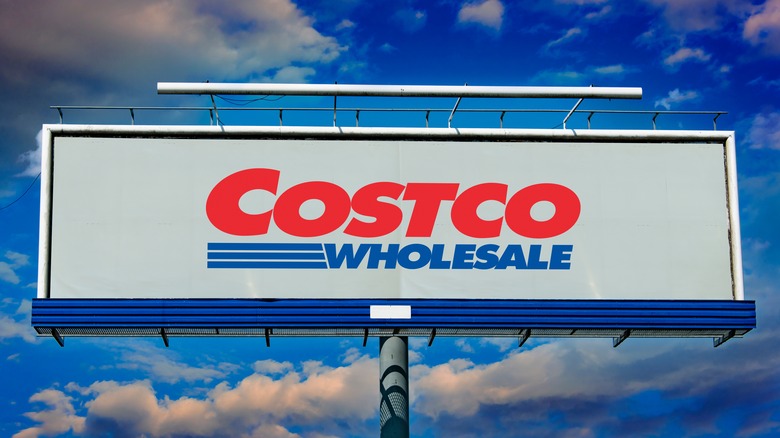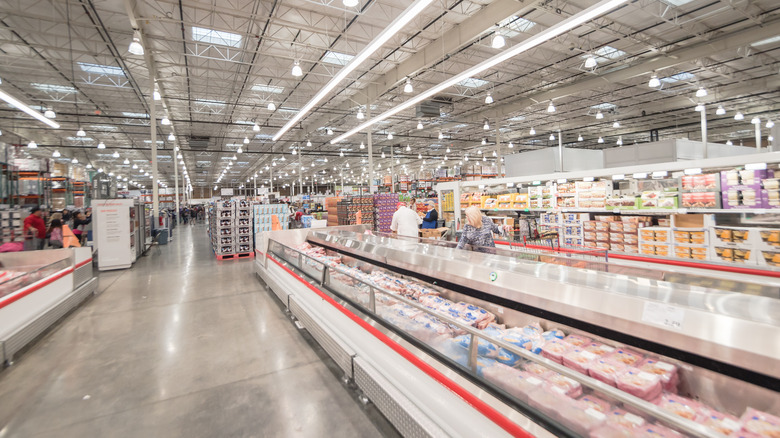The Reason Why Costco's Kirkland Signature Products Are So Cheap
Costco members know that there is no experience quite like shopping at the warehouse store. You literally have to be a paying member to even get in through the doors, and that's only the beginning of the allure. The store is a massive, bare-bones warehouse with no frills or enticing displays, yet it attracts millions of customers a year who are eager to try out the self-serve format in the name of savings. The store doesn't even really advertise. However, loyalists to the brand flock to the store to get bulk amounts of high-quality products at a low price. Well, and maybe a piece of Costco's famous pizza to top off their trip.
One of the main draws to shopping at Costco in comparison to other membership-driven box stores is its Kirkland Signature brand. The average Costco shopper will purchase what seems to be Kirkland Signature everything during their trip — food, home goods, healthcare items, etc. The house brand has come to be known for being reliable and low-cost, and that wasn't by accident. There's a reason why the brand that's exclusive to Costco is one of the massive drivers for members to renew their subscriptions year after year.
There is a formula and methodology to how Costco is able to keep the price of its Kirkland Signature products so low. We decided to get down to the bottom of how Costco is able to keep its private label so cheap without compromising its quality.
Costco puts a lot of thought into developing Kirkland Signature products
Contrary to popular belief, Costco just doesn't slap its "Kirkland Signature" label on any and every product it can get its hands on. The warehouse famously only sells about 3,800 products at a given time, with that number including a combination of Kirkland Signature and name-brand products. Even a similar wholesale club like BJ's typically has nearly double the number of products on its shelves at a given time (via CNN). It means that every Kirkland Signature product that ends up on the shelves was carefully thought out and researched before the store decided to sell it in bulk. That also ends up translating to customers trusting the brand, because Costco has taken out the guesswork for them by telling them that anything with the in-house label is a high-quality product.
The attention to detail goes even further, particularly when it comes to keeping supply chain costs as low as possible. That was the thought process behind the 2014 decision to change the shape of Kirkland Signature cashew jars. By switching from a round container to a square-shaped jar for the nuts, the manufacturer could fit a larger amount of product onto every truck. It may seem like a small detail, but it has a major impact on Costco's yearly profits and impacts the price tag customers see in its stores (via CNN).
Having a single brand name drives more sales
Kirkland Signature is a humble brand in appearance, and has been a staple on the shelves since Costco began selling all of its privately labeled products under the brand name in 1995. The name pays homage to Kirkland, Washington, which was the original location of Costco's headquarters. Prior to the switch, the company had several different names for its store products such as Chelsea Toilet Paper and Simply Soda (via CNN). However, the switch to one cohesive brand not only helped with brand recognition among Costco customers, but also was a money-saving measure.
Costco only has to have one uniform packaging for everything, forgoing the need for large marketing strategists and designers. Additionally, Costco doesn't need to fund extensive legal operations for trademarking and approving different brand names for products in various categories. It's one brand that attempts to appeal to all members, and it's clearly a method that's succeeding, considering Kirkland's $59 billion in sales in 2021 alone (via Costco).
There's also a psychology behind keeping the customer's options limited. By only offering one or two options for items in most categories like cereal or dish soap, customers are actually encouraged to buy more. They don't have to put much thought into every purchase, taking some of the work out of a mundane shopping trip. Additionally, research shows that customers are more often unsatisfied with a purchase if they had to choose from a variety of brands (via Forbes).
Some Kirkland Signature products are co-branded with big names
A huge portion of the products customers will find on Costco's shelves are simply labeled with the Kirkland Signature brand like typical "generic" products at any average grocery store. But certain items are often labeled with both Kirkland Signature and a large name-brand company to create a quality product for a low price just that is totally exclusive to customers who are Costco members. One of the easiest partnerships to recognize is Starbucks' Kirkland Signature House Blend, which is sold in two-and-a-half-pound bags. The private label has also teamed up with Reynolds aluminum foil, Jelly Belly jelly beans, and Ocean Spray cranberry juice, which are some of the other co-branded products with household name products (via Moneywise).
Those types of partnerships ultimately help Costco save on shelf space by offering a name-brand and generic version of a product in one. It's a far cry from the early iterations of generic store products seen in the 1970s that weren't marketed to customers as trusted items, giving them the stigma of being low-quality products in comparison to familiar names (via Marketplace). Costco doesn't see sales split between two different brands and gives the customer one single option to pick up while perusing the aisles. It also helps boost Kirkland Signature's credibility by co-branding with an already well-trusted and profitable brand (via DSN Retailing Today).
Costco doesn't try to make a Kirkland Signature version of every product
The limited number of products at Costco compared to the average grocery retailer really impacts the specific products that get the Kirkland Signature label. As we said, Costco doesn't just label anything and everything with the coveted "Kirkland Signature" name. In 2021, the average supermarket sold more than 35,000 given items at a time (via FMI). That makes Costco's fewer than 4,000 items seem like next to nothing, even though anyone who has visited a store warehouse knows that it doesn't feel understocked by a long shot. "We try to be agnostic on [the Kirkland Signature brand]. We try it like any other brand," Costco's CFO Richard Galanti told the Wall Street Journal in 2017.
Costco offers a limited number of products, and only a fraction of them are under the Kirkland Signature label. It's a delicate balance, as Costco knows even its best efforts just can't compete with solid brand recognition. For example, you won't find Kirkland Signature cola on the shelves anymore, as the brand decided that Pepsi and Coca-Cola have totally cornered that market and the majority of customers aren't interested in exploring a third option (via CNN).
Kirkland Signature products have better profit margins for Costco
The major appeal for any retailer to invest into creating its own private brand are the general profit margins. Low prices are part of the ethos of Costco, and co-founder Jim Sinegal has always prioritized this factor. It's why one of his steadfast rules for Costco has been that no item in the store can be marked up by more than 15% (via New York Times). That includes alcohol, which isn't a typical pricing point by any means (via Wine Spectator). In comparison, as of 2021, Walmart's average price markup was 32% and Target's was 46% for items in each store (via Seeking Alpha). Realistically, Costco could be making more money on some of its cult-favorite items, but it's not part of the business model. That commitment helps to further boost the trust among its customers.
The success of a private label like Kirkland Signature helps Costco stick to this markup model. The company saves money through the private brand by purchasing products directly from the supplier rather than dealing with any middlemen. This is a factor that typically drives up costs for the average retailer, which needs to source tens of thousands of products to fill up its shelves (via Business Insider).
Costco sources everything in bulk
Another factor that helps Costco's profit margins significantly is its commitment to buying in bulk for its Kirkland Signature brand, just like its loyal customers do at the end of the supply chain. The bulk factor is a major draw for suppliers to be incorporated into the brand's private label, especially in sectors like wine that typically aren't bought or sold in massive quantities. Those manufacturers may be able to sell their individual products, like bottles of wine, for more on their own if they didn't opt to be labeled as the generic brand. However, Costco signs massive contracts committing to purchase bulk amounts from suppliers for its Kirkland Signature label, likely making those suppliers more money in a shorter amount of time than they would with traditional sales.
When brands like wineries partner with Kirkland Signature, they are ultimately introduced to a massive and committed customer base in Costco stores. If those customers are particularly satisfied with a product, like wine made by a specific variety of grapes, they might be interested in seeking out higher-priced options from the original retailer in the future (via Wine Spectator).
It sells everything in bulk
Costco also has the added benefit of almost guaranteeing that its customers are going to buy large amounts of its products, likely more than they would at a typical grocery store. It sells almost everything in bulk for that reason, which also benefits its profits in the long run. Customers approach a shopping trip to Costco differently than the average grocery store. There is the mentality to "stock up" on items because they are cheap, which can lead to overbuying. As DealNews editor Benjamin Glaser told The Motley Fool, "Great prices are why you walk in to buy milk, and walk out with a big-screen TV." Kirkland Signature's low markup prices are often a culprit.
Even the sheer amount of toilet paper Costco sells is astounding. Back in 2012, a CNBC report determined that Costco sold one billion rolls of toilet paper in a single year. It's enough to go around the earth 1,200 times (via YouTube). This was nearly a decade before the great toilet paper shortage of the 2020 COVID-19 pandemic, so we can only imagine how high those numbers are now.
Costco invests a lot into its Kirkland products
It's not a surprise that the majority of Costco's spending ends up going toward its Kirkland Signature brand. Costco, unless it partners with other brands, is solely responsible for the packaging, sourcing, supply chain management, marketing, and more for every product under that umbrella. However, it's clear that the investment is paying off with brand loyalty, and why other big retailers are following the Kirkland Signature lead with a more direct-to-customer business model (via Retail Dive).
Costco's commitment to the Kirkland Signature brand is also a key indicator of the way private store labels have totally impacted the shopping market, and how public opinion toward generic brands has shifted in recent decades. In 2022 more than ever, in an attempt to save money wherever they can – with inflation and supply chain issues – people are opting for generic store labels that often boast the lowest price (via Forbes). In the case of Costco, Kirkland Signature as a brand is a draw to people paying for annual memberships. The low price is what first appeals to customers, but the high-quality products are what keep them coming back for more, as is evident with Costco's long list of successful product launches (via CNN).
Costco makes added profits through membership fees
A major factor in Costco's abilities to keep prices low is the membership fees. Costco members pay between $60 to $120 a year to shop at the wholesale club, in comparison to the typical catch-all store that costs nothing to walk through the doors. Those fees end up accounting for more than half of the company profits. It's not a total shock that those fees rack up quite a profit for the brand, as Costco has more than 90 million loyal members who shop at its stores, according to a 2018 CNN report. Costco members are incentivized to pay the annual fee in exchange for the ability to access the chain's low prices and exclusive Kirkland Signature items.
Because Costco is able to rely on annual fees for such a large percentage of its profit, it's able to apply cost-saving measures for those members. For example, Costco has famously always sold its rotisserie chicken for $4.99, which is oftentimes less than half the price that other grocery stores label their home-cooked birds. The price tag doesn't generate any profits for the company, but it isn't designed to. The purpose of the low price is that it encourages members to come in for the deal, and potentially purchase more than just a $5 chicken during their shopping trip (via Vox).
Costco doesn't pay for advertising
It's not often that you flip on the TV and see an advertisement for Costco's low prices and famous food court. That isn't just a twist of fate — it's because advertising isn't a focal point of the wholesale brand's overall operation. Another benefit that those loyal Costco members get – and up to 90% renew their subscriptions to the store year after year – is that the brand doesn't have to work overtime trying to attract new customers to shop in its stores (via CNN). It means that members can enjoy all of the best prices whenever they enter a Costco without being bombarded with advertisement deals on a regular basis.
Even decades ago when Kirkland Signature was still a relatively new brand on the shelves, Costco never paid for billboards and commercials to attract new members into its stores because it just wasn't necessary. The decision helps the retailer to save 2 percent or more a year in costs, and it's one of the savings that is reflected back in the low price tags of most of the brand's products (via New York Times).
The store is bare bones
Costco also saves money by not hiring employees to unpack boxes, stock shelves, and set up elaborate store displays to attract customers to pick up a new item. Anyone who has been to a Costco knows it's a unique experience that is comparable to a treasure hunt. The store is full of industrial shelves and massive boxes of bulk products for eager customers to find and throw in their carts. An added benefit to keeping the store plain and simple is that Costco also doesn't have to pay money for research and supplies to keep the design on trend. Costco warehouses often don't even have windows inside, let alone decorated spaces. Aesthetics just aren't a factor, and they're another reason that the brand can pass along savings to its members (via Business Insider).
In fact, Costco makes a whopping $1,200 per every square foot of its store, which is double that of the average grocery store. The added gimmicks and displays aren't necessary — the brand is able to turn over its select amount of products, many of which are under the Kirkland Signature brand, much faster than other competing retailers (via CNN).
